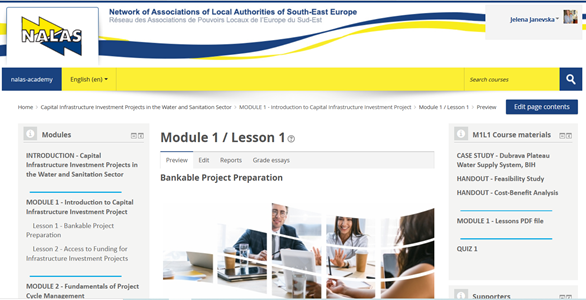
NALAS e-Academy has been enriched with a new e-learning course on Capital infrastructure investment projects in the water and sanitation sector.
The course is available in English language and the first delivery will be launched with an introductory webinar on 20 April 2022, and continue in the next five weeks.
Course objective
The overall objective of the course is to enable participants to guide, follow, and actively participate in the preparation, development, and implementation of the capital infrastructure investment projects.
Target group
The course is designed for decision-makers, middle management of public utility companies and local governments and project implementation unit staff.
Course Modules
- Module 1 – Introduction to Capital Infrastructure Investment Projects (CIIP)
- Module 2 – Fundamentals of Project Cycle Management.
- Module 3 – Preparation and Development of Capital Infrastructure Investment Projects
- Module 4 – Organisational Set-up and Arrangements for Project Implementation
- Module 5 – Main Implementation Phase, Project Closure, Monitoring, Evaluation and Audit
The entire Course takes five weeks, with one module delivered per week. Each module consists of 2 lessons. The e-Learning course will start with an introductory webinar in week 1 and will end with a closing webinar in week 5.
The nomination of participants is done via NALAS member LGAs, until 18 April 2022.
For more information, please contact Ms. Jelena Janevska, NALAS Knowledge and Communication Manager, janevska@nalas.eu.
Learn more about NALAS e-Academy and its annual calendar: http://www.nalas.eu/services/E-academy.
The course has been developed within the Regional Capacity Development Network for Water and Sanitation Services (RCDN).
RCDN aims to increase effectiveness and efficiency of the water utilities in the Western Balkans, contributing to better service provision with larger numbers of population groups getting access to drinking water and sanitation services and meeting the European Union (EU) environmental Acquis Communautaire. To achieve this, RCDN has three key components: 1) Association Development, 2) Capacity Development Offer and Delivery and 3) Partnership and enabling Capacity Development Environment.
RCDN works with LGAs and APUCs in Albania, Bosnia and Herzegovina, Kosovo, North Macedonia, Montenegro and Serbia, while the final beneficiaries are the top and middle managers from municipal and regional utility companies and officers in charge in municipalities. The project is managed by GIZ, on behalf of SECO and BMZ, and is implemented by a Project Implementation Team consisted of IAWD, Aquasan and NALAS.